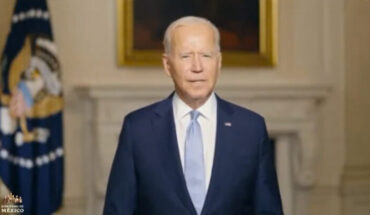
Two weeks after the plebiscite was made, he decided whether to start a constituent process to write a new Constitution, or the doors to that option were closed, and a week after he left the General Council for National Renewal, the Minister of Defense and former president of RN, Mario Desbordes, entered the debate that divides waters in Chile Vamos, and that from La Moneda they have tried to keep at bay to avoid new flanks of conflict.
Overflows departed, noting that “I am not afraid of democracy”, in clear allusion to those on the verdict of Rejection and who have made all kinds of arguments to support a discourse that has been questioned several times from the centre-right sector itself. This was the case of Pablo Longueira who accused the fact that the “Rejection to reform” was not understood, or Ms Ximena Ossandón, who questioned the “unincentive” effect of her opponents’ campaign.
But Overflow did not stay there, and noted another major factor used since those who are committed to preventing the Apruebo option from being imposed, noting that “it is not true that there is a blank sheet, clearly what we have ahead is a constituent process with a very clear framework”. He added that he finds it hard to understand that “from the very mouth it comes out that the constitution is not going to fix any problems for you, and that that same person, I line often, says that you can’t change the constitution because if you change the constitution, everything goes down.”
Whoever was one of the leaders of his sector after the social outburst, which also prompted him to try to unsear him from his role under RN, addressed his view of the fundamental aspects he understands should be maintained and which ones would change the constitutional text. In this sense, the former deputy acknowledged that the current Constitution is not now recognized as its own by the majority of Chileans and that is, in his view, “a very negative factor”.
“Does the Constitution have good things?” asks Overflows, “of course,” he replies. “But there are also other things I don’t like in this Constitution,” the Secretary of State and former President of National Renewal said without going into detail because if I had it, it would be coming out of the “framework” raised by the President.
One example, he said, “I am an advocate of the broad concept of subsidiarity, but seriously. The Constitution does not define subsidiarity, but the few things that refer to it are in the negative. And I invite you to see the books of the Institute of the Stadium of Society (IES), which is the school that I like and hopefully we could take a lot of what they raise, where the true principle of subsidiarity is analyzed from our perspective.”
It brazened Evópoli’s gaze on a minimalist Constitution by noting that its choice is one that is one that is one that is part of recognizing “the fundamental pillars of our society” and promotes “respect for all the rights enshrined in the universal creation of human rights; right to life, freedom, free expression, free association, etc., which are in this Constitution. The right to property, which is also in the universal declaration of human rights. And so on.”
The Secretary of State did not shy away from a sensitive issue, such as explaying the rules that constituents will have to define, and in this case aligned himself with the government by noting that the 2/3 should be in all three instances. “I would expect it to be so,” he said, “article by article, general framework and the end.” Overflows hopes so, but he’s not in favour of it being an imposition.
“The constituent body has to issue an operating regulation and that is where it will be discussed. Such a regulation also requires consensus. And I am confident that we will have a constituent process involving people with constructive, democratic and aware spirits of the importance it will have,” he added.
Finally, and in defense of President Piñera, he aligned himself with the speech of the Minister of the Interior, Víctor Pérez, noting that the legacy of the Representative will be to have chosen the institutional alternative at one of the most complex moments of the outbreak. “The institutional path is thanks to President Sebastián Piñera, he was the person who summoned us on November 12 to seek a political exit, and may have decreed a state of emergency. He’s the one who summoned us to dialogue. A lot of people on the 12th of novieHe said That Piñera said nothing in that night’s speech, and that’s very unfair, because he was the one who called a political outing together,” he said.





